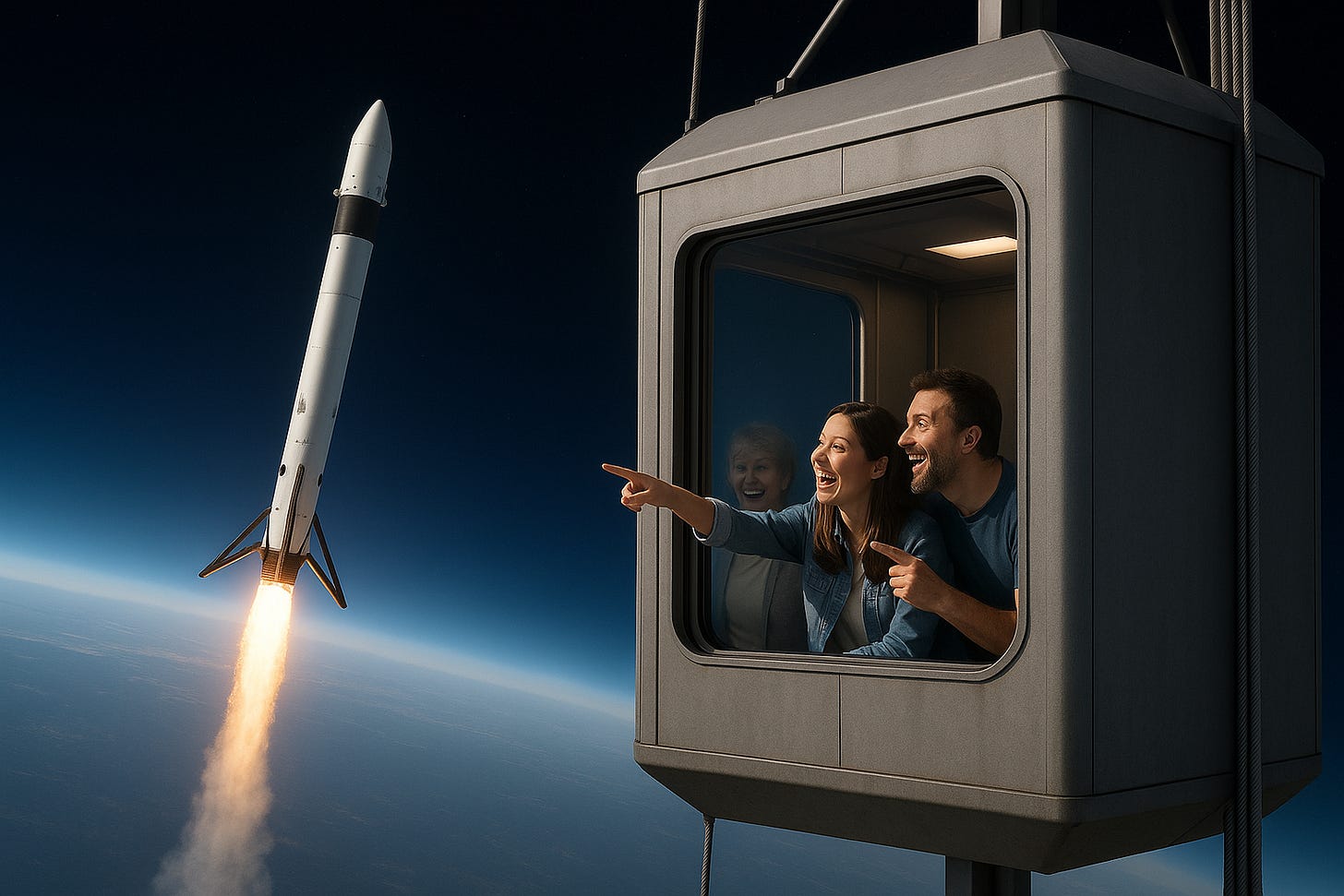The Exploding Space Race
Who can blow up the most rockets? Enquiring minds need to know.
Did you know that Australia has a space program? I apologize in advance for the obligatory joke: And just as you'd expect, their rockets go down (under) instead of up!
To be fair, that probably wasn't what they intended. they can't help it if they live in the bottom of the world (excepting Antarctica)! Anyway the Aussie rocket was launched on July 29, 2025. It lasted 14 seconds before crashing back to the ground1. For reference, the Wright brothers' first flight at Kitty Hawk lasted only 12 seconds and covered a big 120 feet. After 123 years we've gained 2 seconds! Progress!
Watching the video, it looked to me like the lifter had three engines and one of them failed to do a complete burn. Instead, it kind of fizzled, causing the rocket to go into a curve to the side instead of straight up. Two of the engines put out long streams of plasma. The third put out a short orange flame. Fine for cooking marshmallows, not so good for putting anything at all into space.
This was Australia's first attempted launch in more than 50 years. The rocket was built and owned by an Australian company, Gilmour Space2. They had hoped it would reach orbit. Apparently, they didn't risk a real satellite on it, though, which turns out to have been a smart move. I mean, you can't burn through too many millions of dollars in one launch, or there will be nothing left to burn through the next time!
Australia isn't exactly known for being a space super power. Honestly, the only space super power right now is SpaceX. All the rest, including NASA, The European Space Agency and the Chinese and Russian space agencies are, at this point, also-rans. No, strike that. NASA is more of a has-been, since the majority of their launches these days are actually contracted to SpaceX.
Come to think of it, I can't even swear the Russians are still launching. Hang on while I check. ... Yes. Yes they are launching, although their (official, public) launch schedule isn't really busy. But that's neither here nor there. If you add up the whole world, space is busier than it's ever been, with more countries (or groups of countries) putting stuff and people into space than ever before.
Lots of rockets blow up or crash. And, interestingly, once they get away from the Earth, a lot of their payloads crash, too. Just last month a Japanese company tried to land a probe on the Moon and succeeded, except that it hit much harder than intended3.
Meanwhile, a month or so before that, back near the beginning of May, an old Soviet4 craft crashed in the Indian Ocean5. This was launched in 1972 and was supposed to go all the way to Venus. Instead, it ended up orbiting the Earth for 53 years until it came back down this year.
Are we seeing a pattern here? Take-offs and landings are really hard (Pun not intended. Really!). That Soviet satellite didn't escape the Earth's gravity, so it got stuck. That was a launch problem. The purpose of a rocket is to get the part that matters - the crew capsule, the satellite, the probe, whatever - either into the correct orbit around the Earth, or to get it so far away from Earth that it can do whatever it's supposed to do.
But gravity is strong and it takes a LOT of power to beat it. And if you're using a rocket, that power comes in the form of a really big, continuous explosion. The fuel is dangerous. The ignition is dangerous. And with all that power, even a small percentage miscalculation can have outsized effects. That matters when landing, too. Gravity accelerates things. When you're trying to land on the Earth or the Moon or whatever, gravity is pulling you back down. In other words, you're falling. On Earth you can use a parachute to slow down. On the Moon you can use a parachute for decoration or to hide your view of how fast the ground is coming up.
Fun times!
Anyway, there's a sort of answer to the whole space launch thing. It's called the space elevator. The idea is, you send up a cable a few thousand miles long. If you do it very near the equator, the spinning of the Earth will keep it from falling back down. Then, you attach an elevator and you can pull things up the cable slowly. It will still take the same amount of energy as a rocket does, because you still need to fight the same amount of gravity. But with the elevator, you don't have to fight it all at once. You can do it with a nice, smooth motion instead of riding on top of an explosion.
The great science fiction writer Arthur C. Clarke wrote a book involving a space elevator called The Fountains of Paradise.
It's a brilliant idea. There's just one problem. It can't be done with current technology. The problem is that a cable long enough to reach orbit would be torn apart by its own weight. Then you have that falling problem again, followed suddenly by the crashing problem. There are some researchers working on making a material (usually involving carbon nanofibers) that can make the cable for a space elevator. They haven't succeeded yet. Sorry. No elevator to space any time soon.
Until they figure out how to make a space elevator (or maybe a space escalator would work?), the growing space sector will at least keep us entertained with videos of exploding and/or crashing rockets. They really are fun to watch.
Lest you forget that I write more (and sillier) stuff than just Technoscreed:
From the author of the Mauser and Keeg Adventures, Tree of Bones and Shadow of a Dream comes All Our Magic Dark and Strange, a collection of fantasy short stories all set in the same dark and strange world.
I was going to make a joke about the Gilmore Girls here but since I never watched the show, I wouldn't know where to begin. But it would have been witty and a little bit cutting!
For those of you kiddies how might not have learned this in school, for most of the 20th century, there was a country called the Union of Soviet Socialist Republics, aka the Soviet Union. It was based in Moscow, so we often just called it Russia.




